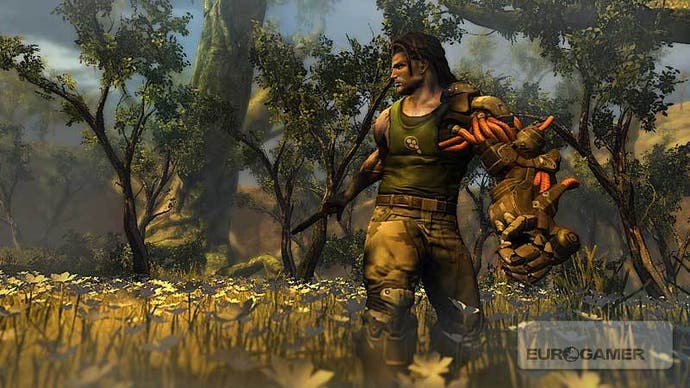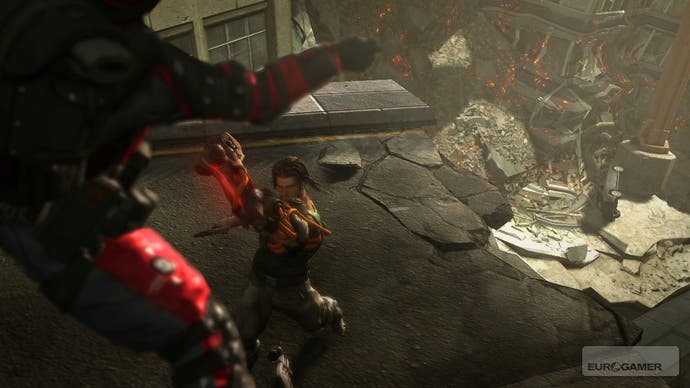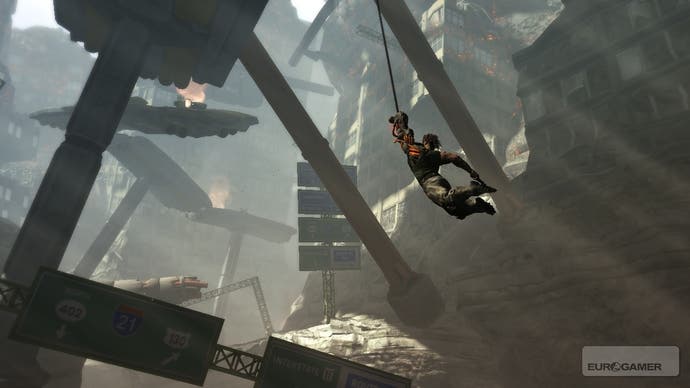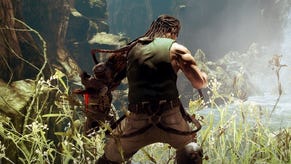Bionic Commando
Swing out brother.
Twenty years. That's an awful long time for a videogame series to lie dormant. Since it appeared in arcades in 1987, and in fuller form on the NES in 1988, Capcom has resolutely ignored its arcade platformer (besides allowing Nintendo to make a Game Boy Color version of sorts, called Elite Forces, in '99).
"But we enjoy swinging around on an extendable bionic arm shooting thinly disguised Nazis in a roughly satirical manner," bleated a legion (well, a gaggle) of fans. "It sold terribly here in Japan. Nobody cares. You're mad," retorted a gruff Capcom management. And that, for two long decades, was that.
The dialogue was repeated almost word for word when Ben Judd, a lanky, ginger-goateed American with a twinkle in his eye, installed himself as the first foreign producer at Capcom Japan, and started arguing Bionic Commando's cause. He was persistent, though. "I personally am one of the biggest Bionic Commando fans in the world," he says. "I had to push it internally for three to four years." Eventually the company's R&D brass, looking for a Western hit (or perhaps just wanting to shut Judd up), relented.
Judd hired technically savvy Swedish studio Grin, known for its all-new PC versions of Ghost Recon Advanced Warfighter. He persuaded one of Capcom's Japanese design teams to contribute, and help preserve the indefinable Capcom-ness of it all. He probably worried whether he really was mad, and whether anyone else really did care. But those were only the first of his worries.

The next, and biggest, was how to implement the bionic arm and the free-swinging gameplay in full 3D. "We tried multiple, multiple, multiple iterations. When I first suggested it internally, most people said trying to do a swing mechanic in 3D is going to be very tough. I'm pleasantly surprised with how Grin has been able to meet the challenge." The solution they arrived at is most of what Judd is here at the Capcom Gamers' Day in London to show; there aren't many other details.
Set ten years after the NES game, Bionic Commando starts with its enhanced super-solider hero Nathan Spencer released from a prison sentence for a crime he didn't commit (they all say that). Things have changed in the intervening ten fake years and twenty real ones: he's now made out of polygons, voiced by an out-of-work rock star (Faith No More's Mike Patton) and sports movement-accentuating dreadlocks. He's reactivated when Ascension City is ruined by a massive terrorist explosion, shattering it into a mess of twisted girders and leaning concrete slabs that just happens to be perfect for swinging around.
Swinging is accomplished by firing the bionic arm's grapple with the left trigger; it's targeted, just like guns, with a reticule aimed with the right stick, assisted by a certain amount of vertical auto-aim. Rather than latching onto thin air (like Spider-Man's web) or designated grapple points (like every grappling hook in game history), the bionic arm can attach itself to almost any surface. Spencer can swing himself around at will, or zip to any surface by retracting his arm, Lost Planet-style.

Accompanied by a weighty sense of inertia, the freedom with which Spencer can swing around seems quite intoxicating, and we sit mesmerised as Grin's Ulf Andersson and Capcom's Motohide Eshiro experiment acrobatically with the demo level. By contrast the gunplay seems to lack a little punch, but there are always other options. You can use the bionic arm to haul chunks of buildings down on your enemies, or punch and hurl giant rocks at them, or disable them with the grappling hook while you melee their friends.
The arm seems very well realised, with a wide range of abilities backed up by tangible physics, and - hopefully - levels carefully designed around it. Asked about the next Spider-Man game, Judd simply laughs and says, "I do not envy the next development team that tries to create a swing mechanic that's better than this one. We've had a hell of a hard time getting where we are today." Andersson reassures us that the game will not be entirely combat-led, and the arm's natural abilities for platforming and exploration will be exploited.
Less obviously apparent at the moment is the original game's style - the typical Capcom mix of brashness, extravagance and humour that is just as important to the 8-bit nostalgists who love the game. In the level shown, Ascension, is a typically drab and empty post-traumatic ruin and Spencer looks like a standard-issue, musclar outlaw soldier. Judd promises that the story will open the game out considerably. He's also keen to stress that the whole reason for involving Grin so closely with designers at Capcom Japan is to prevent the game's spirit being too comprehensively Westernised.

"There is the typical style of having the US or European office outsource the title to a Western developer, but you're going to lose the Capcom feel," he says. "People who are fans of Capcom games are fans of them for a reason, Japan vibe there." It's far less evident at the moment than it was in the Western-inflected games Judd mentions in the same breath, though - Shadow of Rome, Dead Rising and Lost Planet.
Grin and Capcom could yet do one thing that would infallibly resurrect the NES game's subversive spirit, and cause a stir into the bargain: feature that unmistakable parody of Hitler as the main villain. Judd laughs at the suggestion but doesn't exactly back down from it. "Hitler - Master D, let's call him by his true name - he was the last boss. You couldn't possibly ask me of the existence of the last boss this early in the title's development. So maybe he is in there, maybe he isn't. But I can say that I am a huge fan of the original and I do know what makes Bionic Commando very popular for a lot of people."
We hope he does, for his sake. Bionic Commando clearly means everything to this man. We're not sure whether his fellow fans will endorse this new vision, or whether the millions of gamers born in the last twenty years will have any interest in it. The game's fate rests in that left arm - and so far at least, that seems to be the one thing Grin, Judd and Capcom have got just right.



